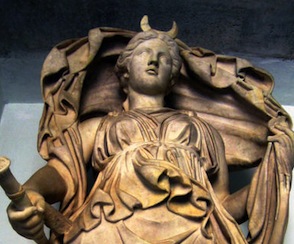Selene
Selene (Selhnh) is the archaic lunar deity and daughter of the titans Hyperion and Theia. She is depicted as a woman either riding side saddle on a horse or in a chariot drawn by a pair of winged steeds. Her lunar sphere or crescent is represented as either a crown set upon her head or as the fold of a raised, shining cloak. Sometimes she is said to drive a team of oxen and her lunar crescent was likened to the horns of a bull. In later times the triad Hekate-Artemis-Selene appears in Roman-era poetry.
Jump to: Blessings – God Of – Primary Cult Centers – Epithets – Symbols –Animals – Sacrifices – Festivals – Honors – Articles – Sources – Links
Blessings
As well as being a goddess of the Moon, Selene was also seen as having dominion over the months, childbirth, the growth of plants and animals, lunacy and moonstone.
God Of
- Moon
Primary Cult Centers
- Elis
- Olympia
Epithets
- Aiglê – Radiance
- Eileithyia – Come to Aid
- Mênê – Moon
- Pasiphae – All-Shining
Symbols
Cresent & Full Moon, Horses, Veil, Cymbals, Torches
Animals
Horses, Oxen
Sacrifices
Aromatics, Moonstone, Selenite, Honey, Milk, Jasmine
Festivals
- Dikhomenia (15th Every lunar month) From the ancestor of the modern word dikhiazo “I bisect, I divide”, which occurs on or very close to the full moon. This day is sacred to Selene.
- Noumenia (New moon) Honours all of the Gods, as well as specifically the Goddess Selene, Apollon Noumenios, the Ancestors and the Agathos Daimon.
Ways to honor
Take the time to gaze up at the Moon; offer up libations and read the Hymns to Selene. Mark the Noumenia and the Dikhomenia. Learn the myths surrounding this Goddess and write poetry for or about Her; Selene was a favourite topic of many poets, especially love poets. A moonlit night brings the feeling of romance. It is said that Selene’s moon rays fall upon sleeping mortals, as her kisses fell upon her love, Endymion.
More…
Articles
- Overview of Selene’s Cult Centers by Unknown
- Overview of Selene’s Main Myths by Unknown
Ancient Hymns and Texts
Modern Hymns and Devotions
- No modern devotions yet… You want to offer one? Contact the member responsible for this page by clicking his name on the sidebar.
Primary Sources
- Aelian, On Animals – Greek Natural History C2nd – C3rd AD
- Aeschylus, Seven Against Thebes – Greek Tragedy C5th BC
- Apollodorus, The Library – Greek Mythography C2nd BC
- Apollonius Rhodius, The Argonautica – Greek Epic C3rd BC
- Cicero, De Natura Deorum – Latin Philosophy C1st BC
- Euripides, Phoenicians – Greek Tragedy C5th BC
- Greek Lyric I Alcaeus, Fragments – Greek Lyric C6th BC
- Greek Lyric I Sappho, Fragments – Greek Lyric C6th BC
- Greek Lyric II Alcman, Fragments – Greek Lyric C7th BC
- Greek Lyric IV Ion of Chios, Fragments – Greek Lyric BC
- Greek Lyric V Anonymous, Fragments – Greek Lyric BC
- Greek Lyric V Timotheus, Fragments – Greek Lyric BC
- Hesiod, Theogony – Greek Epic C8th-7th BC
- Hyginus, Fabulae – Latin Mythography C2nd AD
- Musaeus, Hero and Leander – Greek Poetry BC
- Ovid, Fasti – Latin Epic C1st BC – C1st AD
- Ovid, Metamorphoses – Latin Epic C1st BC – C1st AD
- Pausanias, Guide to Greece – Greek Geography C2nd AD
- Propertius, Elegies – Latin Elegy C1st BC
- Quintus Smyrnaeus, Fall of Troy – Greek Epic C4th AD
- Seneca, Hercules Furens – Latin Tragedy C1st AD
- Seneca, Medea – Latin Tragedy C1st AD
- Seneca, Oedipus – Latin Tragedy C1st AD
- Seneca, Phaedra – Latin Tragedy C1st AD
- Seneca, Troades – Latin Tragedy C1st AD
- Statius, Achilleid – Latin Epic C1st AD
- Statius, Silvae – Latin Epic C1st AD
- Statius, Thebaid – Latin Epic C1st AD
- Strabo, Geography – Greek Geography C1st BC – C1st AD
- Suidas – Byzantine Lexicon C10th AD
- The Homeric Hymns – Greek Epic C8th-4th BC
- The Orphic Hymns – Greek Hymns BC
- Tryphiodorus, The Taking of Ilias – Greek Epic C5th AD
- Valerius Flaccus, The Argonautica – Latin Epic C1st AD
- Virgil, Georgics – Latin Idyllic C1st BC
Links
- Selene
- Greek Mythology – Selene
- The Long Winged Moon
- Myth Man’s Homework Help Centre – Selene
- Wikipedia – Selene
Modern Books
- The Gods of the Greeks by C. Kerényi
